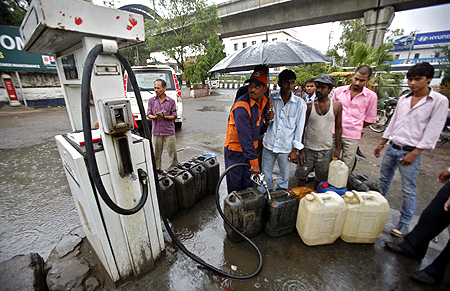Opec as an entity believes falling oil prices will bring increasing pressure on the US shale industry to cancel drilling projects and step up the weekly closure of rigs.

Is the 12-member Organization of the Petroleum Exporting Countries still a cartel able to control world supply and prices of crude oil?
Oil dynamics have undergone such fundamental change, with the US and Russia pumping oil without limits, that Opec, roughly 40 per cent of world production, sees no reason why it should even have the pretence of calling the market shots.
For nearly three decades, the world would keenly await the outcome of periodic Opec meetings to fix the group’s daily output and share of each member country of the total, since that would have a major bearing on crude prices and influence production outside.
Although not openly admitted, the US seeking energy independence’ by using both conventional oilfields and shale fracking routes has led Opec to formally stick to a production target of 30 million barrels per day since 2011. But, any member country exceeding the target no longer invites a frown.
Bloomberg finds for 18 months in a row, Opec output has exceeded the target.
Global supply is staying in excess of demand in an uninspiring world economic environment.
This has kept oil prices at six-year lows.
Opec is pumping at least 1.5 mbpd more than the target it has officially given itself.
Being the biggest producer, Saudi Arabia has a decisive voice in Opec strategy.
Opec as an entity believes falling oil prices will bring increasing pressure on the US shale industry to cancel drilling projects and step up the weekly closure of rigs.
At the same time, Bank of America says in a report that Opec is 'effectively suspended'.
This is because Riyadh is using oil as a weapon to weaken Iran, which is part of the cartel but remains a sore rival in the battle of 'geo-strategic dominance' of West Asia.
If the enemy within is Iran, the one outside the grouping is Russia, which because of falling oil revenues is finding its coffers shrink and currency weaken.
Energy experts do not rule out the possibility of Opec being compelled to hold an emergency meeting to bring stability to the oil market if prices come close $30 a barrel.
Hopes are, however, entertained in some quarters that prices staying at this low will perforce squeeze production in the US, particularly in its relatively high cost zone of shale oil extraction and in other countries, too.
If this happens and Opec manages to stick to its present production schedule, the other Saudi objective of the cartel gaining market share will be achieved.
Low prices have started chipping away at US oil production. But, output fall so far appears 'slower and shallower' to US officials compared to what many thought would be the case.
Importantly, the fall is happening from a 43-year peak of 9.6 mbpd reached in April 2015.
US energy secretary Ernest Moniz dismisses the idea that the price collapse will force a review of the country’s energy independence goal.
Building on this point, Moniz says 'average (US) production this year will still be above 9 mbpd, so the drop-off is not viewed as precipitous. Presumably, the expectations are that over time we’ll see a slow reversal of that drop-off and (lost) production will be restored'.
In any case, whatever the production squeeze, the average US output in 2015 will still be four mbpd more from a few years ago. In short, the US message for Opec is that the world’s largest economy has 'never taken its eyes off reduced oil dependence'.
For the sake of environment protection, attempts at reduction of dependence on fossil fuels are always welcome.
But, International Energy Agency executive director Fatih Birol thinks cheap oil could dilute the resolve of many oil consuming countries’ resolve to move away from fossil fuels.
Birol hasn’t found a reason that would put a pressure on oil prices in 2016.
'Demand remains weaker and we may well see Iran come back to the market and there will be a lot of oil,' says Birol.
A sanctions eased, Iran has set a target to raise production to 4 mbpd by 2016-end from 3.3 mbpd now.
However, oil continuing to deluge the market and keep prices low will put explorers and producers everywhere under stress.
The world’s most valuable bank Wells Fargo told the Financial Times, “We’ve been in energy business for over 30 years, so we are comfortable with cycles. But this one feels deeper and broader and could last longer.”
LOSING GRIP
- Opec accounts for 40% of world oil production
- With the US and Russia pumping without limits, Opec is losing grip on global prices
- Opec is pumping 1.5 mbpd more than the target it has officially given itself
- Global supply staying in excess of demand; Brent crude slid to 11-year low on Monday










